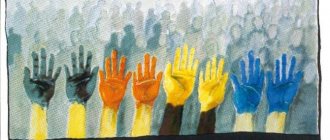Anonymously
Around the clock
Attention! The material contains information about substances, the use of which can cause serious harm to your health!
With the development of new technologies, gadgets are penetrating deeper into our daily lives. Few people can imagine a day without correspondence in instant messengers, social networks, checking email, and the main news on their favorite forums and websites. Mobile phones occupy a special place.
Almost everyone, without exception, uses smartphones, regardless of social status or financial wealth. In fact, the mobile phone has become a necessity. Today, according to statistics, about 40% of the world's population suffers from nomophobia - a pathological addiction to the phone. How to recognize the disease in time? What to do if symptoms of addiction appear? Where to apply?
- What is nomophobia?
- Main reasons for development
- Signs of phone addiction
- Stages of nomophobia
- Prevention of telephone addiction
- Types of phone addiction
- Phone addiction in adults
- Phone addiction in children
- Telephone addiction
- Fear of being left without a phone: the danger of the condition
- Phone addiction statistics
- FAQ
- Treatment for phone addiction
- Help from a psychologist
- Ambulatory treatment
- Rehabilitation of telephone addiction
Treatment prices:
| Service | Price, rub) |
| Types of therapies | |
| Standard detoxification therapy | 3 500 ₽ |
| Double Detox Therapy | 6 000 ₽ |
| Enhanced Detoxification Therapy | 7 500 ₽ |
| Maximum detoxification therapy | 9 500 ₽ |
| Quick sobering up at home | 7 500 ₽ |
| Hospital at home 1 day | 22 000 ₽ |
| Advanced hospitalization | 15 000 ₽ |
| Treatment in hospital | |
| Accommodation | |
| Economy chamber (6 beds) | 2 000 ₽ |
| Standard room (4 beds) | 3 000 ₽ |
| Increased comfort (2 seater) | 5 500 ₽ |
| VIP chamber (1 person) | 12 500 ₽ |
| Individual post 24/7 | 5 000 ₽ |
| Medical and social rehabilitation 21 days | 140 000 ₽ |
| Service | Price, rub) |
| Initial consultation with a narcologist | for free |
| Consultation with a psychologist | 3 000 ₽ |
| Psychiatrist consultation | 5 000 ₽ |
| Coding at home Torpedo | 7 500 ₽ |
| Express output and encoding (doublet) | 13 500 ₽ |
| Coding using the Dovzhenko method | 12 000 ₽ |
| Hypnosis classic session | 13 000 ₽ |
| Ericksonian hypnosis session (NLP) | 8 000 ₽ |
| Coding method Torpedo | 5 500 ₽ |
| Double block | 8 000 ₽ |
| Esperal injection for 1 year | 9 900 ₽ |
| Tetlong for 3 months | 10 500 ₽ |
| Esperal gel for 1 year | 15 000 ₽ |
| Selincro course of therapy | 12 500 ₽ |
| Implantation of Disulfiram for 1 year | 18 000 ₽ |
| Vivitrol injection for 1 month | 26 000 ₽ |
| Naltrexone stitching for 3 months | 35 000 ₽ |
| Neuroimplantation Prodetoxon for 6 months | 47 500 ₽ |
| Narcopsychotherapy session | 50 000 ₽ |
| Neutralization of encoding | specify |
| Psychodiagnostics / pathological diagnostics | 7 500 ₽ |
| Psychotherapy session | 5 000 ₽ |
| Family psychotherapy | 6 000 ₽ |
| Outpatient rehabilitation in Moscow | 33 000 ₽ |
Expand
We will select an individual treatment plan
Free consultation 8-800-200-27-23
Treatment and prevention
At the very beginning, you need to honestly admit to yourself that the problem really exists. Then try to understand why this device is needed, what it means for the victim. You can start self-treatment by turning off your cell phone while the person is on a day off. If this is too difficult to do initially, you need to practice. for example, try to visualize the picture that the gadget is disabled. Then you should analyze your condition, think about why these sensations came. As soon as the visualization stops causing negative feelings, you need to turn off the phone for 1 hour. And each time add 10-20 minutes to this time.
If you need to pay attention to your loved ones and friends, then it’s time to use the phone and make an appointment. When you arrive at the appointed place, do not take your mobile phone out of your pocket, only live communication and nothing else, concentrate on the interlocutor
If the symptomatic picture persists after the techniques performed, you should seek help from a specialist.
Drug therapy and psychocorrection
In severe cases, the situation requires medical intervention and serious therapy. Patients with a history of panic attacks, increased anxiety, and memory impairment are prescribed antidepressants and sedatives. Nootropics are indicated to restore brain function. In severe situations, when dependence on a cell phone leads to attacks of aggression (often observed in adolescents when they are prohibited from using the phone), tranquilizers are indicated to reduce nervous tension and normalize sleep.
A person is constantly under stress. Its consequences are detrimental to the nervous system. Psychological dependence of moderate severity is treated with mild herbal sedatives. This is the well-known “Persen”, “Sedavit”, “Fitosed”, etc. In addition, any addiction is a consequence of one’s own inferiority or childhood trauma, the cause must be eliminated. If a person is unable to overcome the disease on his own, psychologists offer several methods of psychocorrection, which can be carried out individually or in a group. The most effective are 2 methods.
- Cognitive behavioral therapy.
- Interpersonal therapy.
Read also: Time to remove alcohol from milk The goal of both methods is to adapt a person to life next to his phobia. No one is saying that you need to completely abandon your mobile phone, you just need to use it rationally. During the sessions, patients are taught various situations in which the phone is not used, and the underlying reasons that gave rise to addictive behavior are considered.
"Sedavit" is a mild sedative
Prevention
Prevention of phone addiction involves reducing the time you use it. Today, this device can replace everything: an alarm clock, a player, and even a PC. Buy a regular alarm clock so you don't have to put the gadget under your pillow at night.
What is nomophobia?
The word “nomophobia” (eng. nomophobia = phobia of not having a mobile phone) is familiar to few, but not to the phenomenon that it describes. This term refers to a strong fear of being without a mobile phone, accompanied by a whole range of unpleasant sensations when it is impossible to use it.
At the same time, this concept is not identical to the concept of “smartphone addiction”, because it is, first of all, an anxiety disorder, and not just an addiction to a smartphone. However, smartphone syndrome is undoubtedly characterized by signs of addiction. Currently, this disorder is not included in the official register of diseases and is not codified, which, however, does not diminish the seriousness of the problem.
Our hearts demand change
2. Talk to those you love about the need for change. It's best, at least initially, if you frame the conversation around your need to change for the better. While accepting that our new technology can be a miracle, it is best used to improve rather than limit our connections with each other. Ask for or offer help to remind each other that talking, making eye contact, and sharing experiences are important parts of an intimate relationship. Discuss and agree on a plan to enjoy each other and communicate in all ways, both tactile and electronic.
Main reasons for development
Nomophobia usually develops under the influence of the following factors:
- complexes, dependence on the opinions of others, excessive suspicion;
- procrastination, when things accumulate that a person does not want or is afraid to start, which, in turn, only increases anxiety;
- difficulties in making decisions, inability to rely on yourself and act in force majeure conditions - the phone is perceived as a “safety net” that will save you in any situation;
- FoMO syndrome - fear of missing an important call or event, envy when you spy on someone else's life;
- fear of loneliness - likes, calls and messages serve as confirmation that a person is important and needed; but when this does not happen, he feels cut off from real life and considers his own existence empty and meaningless;
- problems with communication, difficulties in the family, inability to build relationships - the absence of truly close people in the presence of hundreds of “friends” and subscribers;
- excessive attention to the ideal virtual “I”, which begins to be liked more than the real one;
- escapism - life on the phone creates the illusion of busyness, social activity, recognition and becomes a form of escape from reality.
Peculiarities
Nomophobia is the fear of being left without a smartphone, tablet, computer, or being away from a digital device. The term appeared in 2008 based on the abbreviation of the English words no mobile phone phobia. Translated, the phrase looks like this: a phobia caused by the lack of a mobile phone.
In the age of information technology, most people feel the need to be in constant contact with relatives and friends, to be able to periodically access the Internet, enjoy music, watch movies, and use various games.
An ordinary person addicted to a mobile phone has nothing to do, nowhere to put his hands. A person suffering from a phobia experiences enormous psychological discomfort, accompanied by characteristic symptoms.
A person is exposed to extreme stress when it is necessary to turn off a smartphone at an important event, meeting, in a temple, theater, airport, hospital
The phone is always nearby. Even while taking a bath, the iPhone should be located in a visible place nearby. After waking up, a person first sees the gadget screen and only then everything else. Before going to bed, the phone screen is the last thing a nomophobe sees that day.
Some people are afraid of getting their smartphone dirty, as the screen may stop responding to finger touch. Prevention from this fear is usually by covering the screen with a protective film or special glass. Panic fear of getting your phone dirty, losing it, or not having a charger on hand in case your mobile device is completely discharged indicates the presence of a clinical picture of the disease.
A person is ready to spend a lot of money on purchasing the latest model and various accessories for it. Some people purchase another one in case their mobile device fails. With two phones a person feels completely safe.
The desire to own a computer, tablet, or several gadgets leads some people to large financial debts and numerous loans, which cause a lot of problems.
It should be noted that some are afraid of losing their phone due to secret information stored in it or too personal information. Others fear that in the absence of mobile communications they will not be able to call an ambulance or other help in case of emergency. Such fears often develop into a phobia. Addicted people do not let go of their mobile phone or endlessly take it out of their purse or pocket.
Signs of phone addiction
If anxiety intensifies—that is, becomes stronger in situations where the phone is not at hand or is low on battery—symptoms of a phobia may appear, including at the physiological level:
- cardiopalmus;
- dyspnea;
- tension, muscle spasms;
- sweating, chills;
- shiver;
- headache or dizziness;
- confusion, obsessive thoughts, insomnia, the desire to check the recording again and again and wake up at night to make sure there is a connection;
- nervous excitement, irritation, fussiness, lack of concentration, feeling of loss, disorientation;
- hysteria;
- panic, panic attacks.
Sometimes nomophobia is associated not only with phone addiction, but also with a neurotic or anxiety disorder.
Forced restrictions
3. Set limits. Remember when you were growing up and your parents might have told you not to watch TV during dinner? Maybe this ban could be updated to turn off cell phones and tablets. You can create an electronics-free zone at the dinner table or during lunch. You can schedule specific times for family adventures—a hike, an evening walk, a day out at home—with tablets and cell phones left, turned off and tucked away in your pocket.
Stages of nomophobia
The fear of being left without a phone at first glance seems like a harmless weakness, but over time it can turn into a serious dependence on a tablet or other gadgets, which is characterized by the following symptoms:
- A person experiences an obsessive, irresistible, uncontrollable desire to hold the phone in his hands all the time, constantly checks for updates, and the thought of turning off the gadget (on an airplane or theater) seems unbearable to him;
- Telephone communication and spending time in phone applications begins to prevail over other interests, hobbies and daily activities;
- The disease progresses, the person spends more and more time on his smartphone, losing contacts and connections with the real world.
- A person is completely confined to communicating via a smartphone and loses most of his social skills.
- Subsequently, anxiety increases. There have been real cases of people attempting suicide due to the loss of their smartphone.
Treatment and prevention of nomophobia
As with other disorders, the first thing to do is recognize that you have nomophobia.
Some may think that it does not pose a serious danger. But in fact, this is a disease that requires treatment. It depletes the nervous system and makes a person maximally vulnerable to stressful situations. The fear of being left without a mobile phone is especially dangerous for children and adolescents. It is important that treatment is comprehensive
Drug therapy
The choice of drugs depends on the severity of symptoms and the complexity of the course of nomophobia. They are prescribed by a specialist. Self-medication can backfire and only make the condition worse.
Most often, the doctor prescribes the following medications:
- Tranquilizers. They help get rid of anxiety and the obsessive fear of being left without a gadget.
- B vitamins. Improve the functioning of the nervous system.
- Sedatives. Calms, eliminates insomnia, helps cope with stress.
- Antidepressants. Prescribed in cases where a doctor diagnoses depression.
Remember that taking medications is not a panacea. This treatment only eliminates the manifestations of nomophobia and also protects the nervous system from constant overstrain. The root of the problem remains.
Psychotherapy
The next stage is completing a seemingly simple task. A person needs to spend 1 hour without a smartphone, observing his emotions and sensations during this period. If everything went smoothly, the time period increases to 2 hours, then to 3, and so on progressively until you can completely get rid of nomophobia.
Preventive measures
Psychologists recommend following a number of simple rules to prevent the development of nomophobia:
And one more tip to help prevent the development of nomophobia: at least once a week, go where there is no network.
Prevention of telephone addiction
Nomophobia, as a rule, is just an expression of deeper psychological problems that a person is trying to escape through online communication. You can prevent the development of telephone addiction using the following simple tips:
- Turn off as many notifications as possible, keep sound/vibration only for calls, and remove unnecessary apps that waste time and money.
- Put your smartphone away at least an hour before bed and don't grab it immediately after waking up: read a book after you've gone to bed and have breakfast in the morning. You can buy an alarm clock and leave your phone in another room overnight.
- Do not look at the screen when crossing the road or driving (unless you are using a navigator).
- Get rid of the habit of carrying your phone around the apartment and give it a permanent place in the house. Do not take the gadget into the kitchen, bathroom, toilet and bedroom - make the rooms “sacred” spaces.
- If your work does not involve calls, do not place your smartphone next to you. Let it be in your bag, jacket, pocket when communicating with colleagues, friends or family members.
- Sometimes you go out without your phone to the store or for a walk: this way you will gradually get used to feeling safe without an electronic “amulet”.
- Practice mindfulness, try to apply the principles of “slow living”. Observe and reflect: what problems are you running away from, what important things or decisions are you putting off? Allow yourself to feel and fully experience all emotions, both positive and negative, without suppressing them. If necessary, discuss your problems with a psychologist or psychotherapist.
- Don't build your life around your smartphone. Expand your range of activities that bring you real pleasure, not the kind you get from endlessly scrolling through social media. Add sports, culinary experiments, and meetings with loved ones into your life. Write by hand, sculpt with clay, try a new kind of creativity. Pay more attention to physical activity and tactile sensations.
How to deal with nomophobia
The fear of losing your phone or not being able to use it is not an indicator of a phobia. Alarm bells that should alert you may be as follows:
- thoughts of being without a phone become intrusive and occur many times during the day;
- fear and anxiety interfere with focusing on work and functioning normally;
- thoughts and emotions associated with the phone interfere with falling asleep and disrupt sleep;
- worries about the phone do not allow you to enjoy communicating with people and engage in social interactions as before;
- health and quality of life suffer.
In this case, you need to start solving the problem, and it is best to seek support from a specialist: a psychologist or psychotherapist. It is important to remember that, as with any other phobia, fear in the case of nomophobia is irrational and is in disproportion to reality. Therefore, relying on consciousness and willpower alone is not enough. It is important to approach the issue comprehensively, taking into account all the psychological background.
It is best to act gradually, carefully and accurately. With small actions, you need to accustom your psyche to the fact that it is safe to turn off your phone for a while or leave it at home, and at the same time find other sources of joy and pleasure in life. These two directions should become guidelines in liberating ourselves from the oppression of the phobia of living without a phone.
So, keeping the first goal in mind, begin to implement the following actions:
- Install special applications that will help you use your phone less. For example, an application such as Hold rewards the user in a playful way for refraining from using the phone. In addition to it, there are other solutions, for example, social media blockers, screen time trackers, etc. Apps that may suit you: Moment, Checky, AppDetox, Breakfee App, Offtime.
- Enter “quiet hour.” At this time, you turn off or put away your phone and do something else. It could be work, sports, diary entries, anything - the main thing is to focus on something that does not require a phone.
- Train yourself to move around your home and office without your phone. So, it is not at all necessary to take your phone with you to the toilet or bathroom - during these minutes you will not miss anything vital, and the device itself will be more intact. You can then create more strict rules, such as not taking your phone into the kitchen or to lunch, leaving it in another room when you play with the kids, or not taking your phone out of your bag at work unless you need it for work duties. This way, you train your brain that you can look away from your phone for a limited period of time, and it’s completely safe.
- The next step could be something like leaving your phone at home and going for a walk, to the supermarket, or to run some errands. If you can experience the feeling of discomfort and anxiety, and more than once, the power of nomophobia over you will significantly weaken.
Apart from this, there is much more that can be done. Try to expand the areas of your life where your phone is not needed, and increase the amount of time you spend away from it. Over time, the fear will weaken and with it the power of the phobia over you.
At the same time, implement the strategies of the second direction - strengthen real connections and offline life. To do this you can do the following:
- Fill your life with personal communication. Distinguish between virtual contacts and real ones, make the latter a priority and increase their share gradually.
- Play the game "I Observe the World." Imagine yourself as a research scientist and start observing what is happening around you. Look at your surroundings and ask yourself various questions. For example, when observing things and objects, think about the path they took before they got here, what their history is. And if you try to contemplate people and philosophize about such matters as their life stories, worldview and motives at the moment, experiences and thoughts, you will be distracted from digital thinking. And at the same time you will develop observation, insight and understanding of people.
- Find yourself a couple of new hobbies and activities. Perhaps you should do some sports or something active. Or maybe you will remember and bring up your past hobbies or personal projects. It can be anything that is interesting and useful to you and to which you give yourself completely.
- Think about how you will occupy yourself in your free time, in the evenings, on weekends and on holidays, when you are tempted to immerse yourself in your phone. Make a list of activities to which you will devote time, plan your free days and minutes.
- Use different ways to obtain information and knowledge other than the phone. For example, you can read news sites on your computer, and instead of using e-books, take up regular ones. Find alternatives to telephone options.
It will be good if you come up with various interesting ways for yourself to spend time and gain positive impressions and experiences bypassing your mobile phone. Consider how you will reward yourself and what milestones you will celebrate. It’s very possible to live without phone addiction and nomophobia, and live as fulfillingly and happily as we lived before cell phones and cell phones conquered the world!
And finally, a small test to check how well you managed to master the material in the article:
Types of phone addiction
Depending on the age of the addict and the nature of the phobia, several types of nomophobia are distinguished, which differ in the nature of the course of the disease and the characteristics of its treatment.
Phone addiction in adults
Nomophobia in adults is often associated with dissatisfaction with one's own life and a desire to escape from problems. Treatment of addiction should be based on psychotherapy. A person must understand and solve existing psychological problems in order to again begin to appreciate the joy of real life and live communication.
Phone addiction in children
Phone addiction is predominantly found in children and adolescents, and this is not surprising, since the fragile psyche is very susceptible to the uncontrolled flow of information. And therefore, when purchasing such a “toy” for a child, you need to think about prevention in advance (this is better than looking for treatment options later). Parents should immediately emphasize that a smartphone is only a means of communication, acquiring new knowledge, and solving educational issues. In addition, there are now many remote parental control applications that allow you to limit both the time spent with the gadget and the applications installed.
Workbooks
Telephone addiction
Fear of loneliness can contribute to the development of nomophobia. If the phone is the only way to keep in touch with those important to a person, the prospect of losing the phone can become unbearable. Also, the phone can become a “cure” for loneliness, and the fear of reliving these painful experiences again makes a person nomophobic.
Nomophobia is the fear of being left without a mobile device!
The evening was golden, the sunset view from the outdoor beach restaurant in Phuket was breathtaking and surprisingly romantic.
All around us, couples celebrating their honeymoon, more mature couples, families, Chinese and Germans uniting for an unforgettable holiday, they were mostly all with mobile phones. Very few people noticed the magnificent sunset and the shine of the sun on the waves, let alone each other.
I immediately remembered a scene from Thorton Wilder's play Our Town: when Emily, who recently died at a young age, is allowed to return to her twelfth birthday. Standing in her childhood kitchen, in that moment with her family, she feels not the joy she expected, but devastation at how casually her beloved family members treat each other. She begs them, asks them to look and really see each other, to enjoy their time together “every, every minute.”
These days, we are more connected than ever to emails and texts, tweets and VKontakte posts, photos on Instagram. With mobile photos and selfies, our lives have never been more documented and public. And yet we seem to see each other less. Our real-life connections have become more unreliable as we stare at our gadgets and ignore each other.
What did we do before mobile phones and tablets grabbed our attention? We spoke. We watched sunsets. We listened. We connected.
How can we begin to reconnect with those we love most?
Events
08.11.21
Residents' trip to the Zvenigorod club "Goliath"
Leisure activities are an integral part of the rehabilitation program for residents. Team games, visiting museums, theaters, exhibitions, picnics...Read more (~2 min.)
«
13.10.21
Travel of rehabilitators of the “Zdravnitsa” Center to “Ruzskaya Alaska”
One of the important tasks of a rehabilitation center for addicted people is to teach them to enjoy life in sobriety, to find...Read more (~2 min.)
«
21.09.21
Guests from the Moscow Regional Duma in
In September, a delegation of candidates for deputies of the Moscow Regional Duma, the head of the election headquarters of the Rodina party, visited. [zdravnews] Employees...Read more (~1 min.)
«
31.08.21
How does the socialization of addicts proceed?
Social adaptation (Resocialization and Outpatient Clinic) is one of the stages of rehabilitation. Characterized by the return or strengthening of social ties, the elimination of manifestations of social...Read more (~2 min.)
«
All events
Symptoms
Sometimes a person experiences a panic attack just from the thought that he will have to be left without mobile communications for a long time, for example, as a result of a long hike, climbing to the top of a mountain, or a trip to the forest for several days or even weeks. When a gadget is lost in the workplace, an employee in search of the lost phone becomes excessively fussy and loses control over his behavior; he scatters documentation around and creates complete chaos.
Anxiety disorder is characterized by the following physiological symptoms:
- trembling in hands;
- chills;
- feeling of lack of air, rapid breathing;
- increased sweating;
- cardiopalmus;
- discomfort in the chest area;
- confusion of thoughts;
- dizziness;
- respiratory disorders.
Psychological symptoms:
- growing excitement;
- strong emotional arousal;
- absent-mindedness, lack of concentration;
- irresistible melancholy;
- a feeling of irreparable loss;
- the desire to immediately rush to look for a mobile phone;
- depression;
- poor sleep;
- panic attacks.
There are indirect signs of a phobia:
- advance payment for cellular communications;
- regularly checking the functionality of the smartphone;
- increased anxiety when the battery charge level decreases;
- unreasonable systematic checking of email;
- the need to regularly view the news feed;
- addiction to social networks;
- desire to be aware of all the innovations in global cellular technologies;
- loss of interest in other areas of life;
- fear of losing, dirtying, scratching or breaking the phone.
Fear of being left without a phone: the danger of the condition
The consequences of drug addiction and nomophobia are reflected in all areas of life.
- Work: Worry itself prevents you from focusing on a task, and the desire to distract yourself with your phone turns into hours of mindless Internet surfing.
- Health: Your eyes become strained, your neck hurts, your sleep is disrupted, not to mention that staring at a screen can cause you to get into an accident or get injured.
- The general emotional state worsens, leading to the development of depression.
- Finances: Uncontrollable spending and impulse purchases online drain your wallet and plunge you into debt. According to App Annie, smartphone users spend $120 billion a year on apps and in-app purchases. This may also include buying an expensive phone simply to increase your status in the eyes of others and endlessly “customizing” it - accessories, new ringtones, wallpapers, settings.
Remember how it was before?
4. Discover and enjoy old ways of communication. The point is not to never text or wish someone “Happy Birthday” on VKontakte. It is a matter of communicating with others in more diverse ways. Write a note on the refrigerator to someone you care about, expressing your love. While he or she is sleeping. Call a friend every now and then for a live conversation, not just email and text messaging. Hearing the voice of a loved one can be a special joy after years of electronic communication. Or just cuddle and listen. Play board games with your partner that you used to enjoy. Look into each other's eyes, talk, listen, hold hands.
Phone addiction statistics
There are no exact statistics on how many people in the world today suffer from nomophobia. However, many agree that these numbers are large and growing from year to year. There is data from a 2012 study, and it is scary. The British company SecurEnvoy, which researched the problem, concluded that 66% of the population suffers from this phobia, of which 70% are women and 61% are men.
- The child has withdrawal symptoms without a phone. What to do?
For many parents, there is only one “effective” way to deal with gadget overload—simply pick them up. But, as a rule, such tactics do not bring any results. Firstly, in most cases, a child cannot be left without communication. But this is also not always possible to do with the simplest mobile phone. A smartphone is necessary for completing school lessons, searching for information needed for studying, etc.That is why reasonable restrictions must be combined with psychotherapy. But we are talking not only about individual, but also about family consultations. With such problems, joint, family leisure and the formation of traditions are more important than ever.
- What is the fear of the phone called?
There is also the exact opposite phobia - the fear of telephone conversations. This fear is called telephobia. - I'm addicted to my phone.
Where to contact? The rehabilitation center employs highly qualified specialists who successfully treat nomophobia, helping people return to a full life. - What are the consequences of telephone addiction?
Phone addiction leads to many social consequences:- Loss of social skills;
- Problems in the family, at work;
- Development of an inferiority complex;
- Loss of interest in the outside world;
- Development of apathy and depressive states.
FAQ
We have compiled a database of frequently asked questions and answers to them. Read, maybe you will find the answer to your question
Nomophobia is often just a way to hide from impending social and psychological problems. Therefore, the first thing a husband should do is talk to his wife, identify the reasons for her behavior and try to correct the situation. If necessary, it is worth involving psychologists in the work.
Modern children and technology
5. Set a loving example for your children. Our children are technical wizards, fearless and skilled. They have been involved with electronics since birth! But you may have noticed that there are times when they lead a virtual life. Perhaps too often than I would like.
“I realized this with my nine-year-old daughter and six-year-old son when I suggested we go for a walk in the park on a beautiful summer day and they didn’t even look up from their iPads,” a patient recently admitted. "They both said, 'No... we'd rather stay home.' What ??? That's when I realized we needed to make some changes—and that change had to start with me and my wife. We needed to rebuild our real lives as a family.”
Using technology wisely can free you to rediscover the pleasure of looking into the eyes of someone you love, speaking and hearing words that strengthen your connection and soothe your spirit.
It can also help you teach your children to find joy in experiences, to truly see amazing sunrises and sunsets and each other, to enjoy every moment you share, to cherish each other, every minute.
Literature
- Get off your phone! : how to build a healthy relationship with your smartphone / Katherine Price; translation from English by Gleb Trzhemetsky. - Moscow: Mann, Ivanov and Ferber, 2021. - 229 p..
- Phone addiction or How to return to the real world / Personality in a changing world: health, adaptation, development / 2017/li>
- The influence of dependence on information technology on the socialization of the individual / Alexandra Vladimirovna Weisburg / Journal “Bulletin of Economics, Law and Sociology”, 2021
Article verified by an expert
Terekhov Vasily Stanislavovich
Head of the prevention department, coordinator of rehabilitation programs. Experience in the field of rehabilitation and social adaptation of persons with dependent behavior for more than 7 years.
Similar articles:
The best narcologists in Moscow
Sleeping pill addiction
Alcoholism pills
What to do if drug coding does not help?
Stages of drug addiction treatment
Causes of addiction
Nomophobia, like all disorders, does not appear just like that; it needs reasons. Addiction is not about pleasure, otherwise many would be addicted to chocolate. Addiction occurs when we try to relieve psychological stress, cope with some problem - a feeling of loneliness or the inability to change our life for the better.
Psychologists identify several causes of mobile addiction:
- Inability to communicate. People who do not know how or are afraid to communicate in person are most often susceptible to mobile addiction. Such people, as a rule, are driven into boundaries due to complexes. During online communication, you don’t need to look your interlocutor in the eyes, choose words for conversation and watch your gestures; it’s enough to keep your phone at hand.
- Problems. Phone addiction occurs when a person has problems that he is afraid or does not want to solve. The Internet and social networks become an imaginary way out of a difficult situation and an opportunity to hide from problems.
- Complexes. People who are insecure love to communicate online more, because no one sees them and no one knows what they really look like. On the one hand, a person is embarrassed by his “shortcomings” and because of this he is more comfortable communicating virtually. On the other hand, he cannot make independent decisions and bear responsibility for it.
- Boring life. Mobile addiction is typical for people who have no significant events in their lives. Therefore, they prefer the Internet, where they can be anyone and do anything, adding risk to their lives.
- Feeling needed. Calls, messages and notifications make a person feel needed and important. If in ordinary life they are lonely, then the visibility of vigorous communication on the Internet gives them a feeling of social demand.











